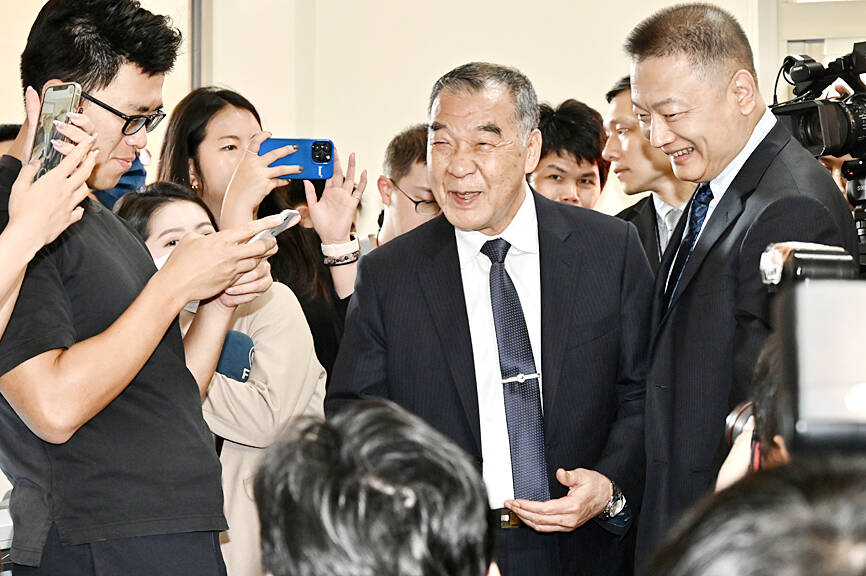Taiwan’s Indigenous Submarine Program would remain on track, Minister of National Defense Chiu Kuo-cheng (邱國正) said yesterday, after the head of the program resigned due to what he said were unfair attacks against him and the military.
Taiwan has made the submarine program a key part of an ambitious project to modernize its armed forces as Beijing stages almost daily military exercises.
Taiwan unveiled the first of eight new submarines in September last year, although it is not expected to enter service until next year.

Photo: George Tsorng, Taipei Times
In a statement late on Tuesday, Admiral Huang Shu-kuang (黃曙光) said that he had resigned as head of the submarine project, as he and the program had been subjected to unfair attacks from people he did not name.
Huang told Reuters that the submarine task force, which includes the navy and shipbuilder CSBC Corp, would continue to operate despite his departure.
“It’s impossible that the team will be disbanded due to one man’s departure,” he said.
Chiu said that Huang is a “conscientious” person, but “members of the task force are all on active duty and can work for a long time. It will not change due to a single personnel change.”
Huang had previously described the submarines as a “strategic deterrent” that could help maintain Taiwan’s “lifeline” to the Pacific by keeping ports along the east coast open.
Taiwan hopes to deploy at least two domestic submarines by 2027, and possibly equip later models with anti-ship missiles.
Chiu yesterday also defended the submarine program and said claims by local media that the costs would soar were “unfair.”
The navy has estimated the cost of constructing the seven vessels over 15 years to be more than NT$280 billion (US$8.62 billion), or about NT$40 billion per vessel.
That is higher than the prototype Hai Kun, which cost about NT$31.2 billion, local media reported.
When asked about the issue by Democratic Progressive Party Legislator Michelle Lin (林楚茵) at a meeting of the legislature’s Foreign Affairs and National Defense Committee yesterday, Chiu said the estimate not only included construction costs, but also expenses related to classified items.
Chinese Nationalist Party (KMT) Legislator Huang Jen (黃仁) also questioned why the cost was expected to rise, quoting Su Tzu-yun (蘇紫雲), a research fellow at the Institute for National Defense and Security Research, who previously said the cost of constructing each of the seven vessels was expected to fall to about 80 percent of the price of building the prototype.
Chiu said that the ministry plans to add “certain equipment” to the subs built after the prototype as it was felt the first vessel was “not necessarily sufficiently equipped.”
Furthermore, NT$280 billion was just an estimate as the budget proposal had not yet been submitted, he said, adding that taking that number and simply dividing it by seven was an “unfair” method of calculating the costs.
Additional reporting by CNA

CHANGING LANDSCAPE: Many of the part-time programs for educators were no longer needed, as many teachers obtain a graduate degree before joining the workforce, experts said Taiwanese universities this year canceled 86 programs, Ministry of Education data showed, with educators attributing the closures to the nation’s low birthrate as well as shifting trends. Fifty-three of the shuttered programs were part-time postgraduate degree programs, about 62 percent of the total, the most in the past five years, the data showed. National Taiwan Normal University (NTNU) discontinued the most part-time master’s programs, at 16: chemistry, life science, earth science, physics, fine arts, music, special education, health promotion and health education, educational psychology and counseling, education, design, Chinese as a second language, library and information sciences, mechatronics engineering, history, physical education

The Chinese military has boosted its capability to fight at a high tempo using the element of surprise and new technology, the Ministry of National Defense said in the Quadrennial Defense Review (QDR) published on Monday last week. The ministry highlighted Chinese People’s Liberation Army (PLA) developments showing significant changes in Beijing’s strategy for war on Taiwan. The PLA has made significant headway in building capabilities for all-weather, multi-domain intelligence, surveillance, operational control and a joint air-sea blockade against Taiwan’s lines of communication, it said. The PLA has also improved its capabilities in direct amphibious assault operations aimed at seizing strategically important beaches,

‘MALIGN PURPOSE’: Governments around the world conduct espionage operations, but China’s is different, as its ultimate goal is annexation, a think tank head said Taiwan is facing a growing existential threat from its own people spying for China, experts said, as the government seeks to toughen measures to stop Beijing’s infiltration efforts and deter Taiwanese turncoats. While Beijing and Taipei have been spying on each other for years, experts said that espionage posed a bigger threat to Taiwan due to the risk of a Chinese attack. Taiwan’s intelligence agency said China used “diverse channels and tactics” to infiltrate the nation’s military, government agencies and pro-China organizations. The main targets were retired and active members of the military, persuaded by money, blackmail or pro-China ideology to steal

DEADLOCK: As the commission is unable to forum a quorum to review license renewal applications, the channel operators are not at fault and can air past their license date The National Communications Commission (NCC) yesterday said that the Public Television Service (PTS) and 36 other television and radio broadcasters could continue airing, despite the commission’s inability to meet a quorum to review their license renewal applications. The licenses of PTS and the other channels are set to expire between this month and June. The National Communications Commission Organization Act (國家通訊傳播委員會組織法) stipulates that the commission must meet the mandated quorum of four to hold a valid meeting. The seven-member commission currently has only three commissioners. “We have informed the channel operators of the progress we have made in reviewing their license renewal applications, and